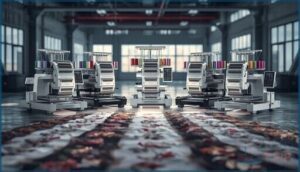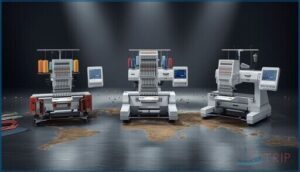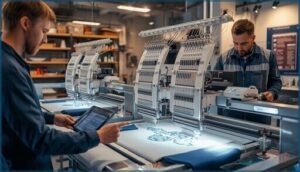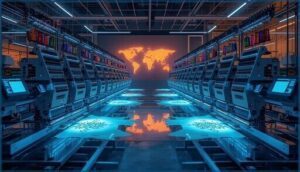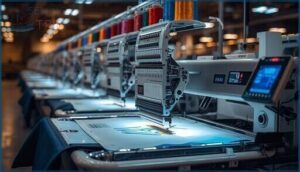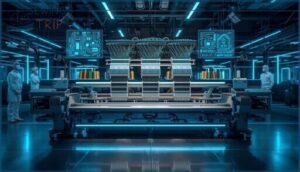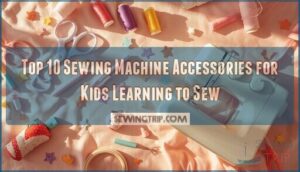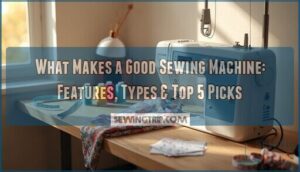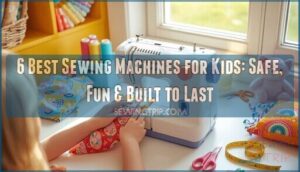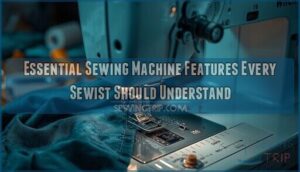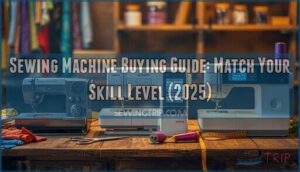This site is supported by our readers. We may earn a commission, at no cost to you, if you purchase through links.
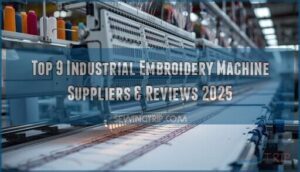
Most buyers approach this the wrong way. They focus too much on head counts and stitch speeds while ignoring the supplier infrastructure that determines whether you’re embroidering or waiting on parts three months from now. A $15,000 machine from a supplier with no US service network costs more in the long run than a $25,000 unit backed by next-day parts delivery and reliable phone assistance that actually answers.
The gap between top-tier and mediocre suppliers shows up in your profit margins within six months. This breakdown covers nine suppliers who’ve earned their reputations through consistent performance, comparing their machines, service networks, and the hidden factors that separate a smart investment from an expensive mistake.
Table Of Contents
- Key Takeaways
- Leading Industrial Embroidery Machine Suppliers
- Top 9 Industrial Embroidery Machines Reviewed
- 1. Smartstitch Commercial Embroidery Machine System
- 2. Poolin Automatic Embroidery Machine System
- 3. Commercial Embroidery Machine Smartstitch S1501
- 4. Compact Commercial Embroidery Machine System
- 5. Industrial Hat Embroidery Sewing Machine
- 6. Dual Head Industrial Embroidery Machine
- 7. Commercial Digital Embroidery Machine Kit
- 8. Ricoma commercial embroidery machine system
- 9. Commercial Embroidery Machine with Laser
- Essential Features of Commercial Embroidery Machines
- Latest Market Trends and Technological Innovations
- Customer Support and After-Sales Services
- Frequently Asked Questions (FAQs)
- Conclusion
Key Takeaways
- Supplier infrastructure matters more than machine specs—next-day parts delivery and reliable support networks prevent costly downtime that can exceed initial savings from cheaper equipment.
- The global market is dominated by six powerhouses (Tajima, Barudan, Xinsheng, ZSK, Sunstar, Happy Japan), with Asia-Pacific controlling 49-65% of production and Japanese brands holding 18-22% of high-end installations.
- Multi-head and automated machines with AI integration, IoT monitoring, and laser positioning now deliver 20-25% higher output while cutting setup time by 90% and reducing error rates by 28-31%.
- The industrial embroidery market is projected to grow from $4.5 billion (2024) to $6.8 billion (2033), driven by automation advances, sustainability demands, and Asia-Pacific’s dominance at 63.5% market share.
Leading Industrial Embroidery Machine Suppliers
Choosing the right industrial embroidery machine supplier goes beyond price—it’s about finding a partner who supports your production goals with reliable equipment and solid assistance.
You’ll find everything from reliable Japanese brands with decades of proven performance to innovative Chinese manufacturers pushing new boundaries—each brings something different to the table.
Here’s who’s driving the market forward in 2025.
Overview of Major Global Brands
When you’re ready to invest in industrial embroidery, six global powerhouses dominate the landscape—and knowing who they are can save you thousands in buyer’s remorse. Sunstar from Switzerland, Japan’s Tajima and Barudan, China’s Xinsheng Sewing, the U.K.’s ZSK, and Happy Japan control commercial embroidery machines worldwide.
These industry leaders shape supply chains and embroidery machine sales through decades of brand comparison and market research, delivering industrial sewing equipment that sets the standard for embroidery machine reviews.
Key Regional Manufacturers (Asia, US, Europe)
East Asian factories produce roughly 65% of the world’s industrial embroidery machines, but you’ll notice distinct engineering approaches when comparing Chinese volume leaders like Xinsheng Sewing to Japanese precision specialists Tajima and Barudan. Together, the Japanese brands capture 18–22% of high-end installations. Regional trends shape your global sourcing strategy in key ways:
- Asian suppliers dominate commercial embroidery machine production with competitive pricing and quick turnaround times.
- US manufacturers focus on niche industrial sewing equipment and aftermarket assistance for embroidery machine brands.
- European markets highlight Swiss and U.K. innovation, where ZSK and Sunstar lead premium segments with cutting-edge automation.
These regional distinctions matter when you’re navigating the embroidery machine market.
Supplier Comparison: Product Range and Support
Choosing a supplier isn’t just about product selection—it’s about getting real support when you need it.
A 12-head machine with all the bells and whistles won’t help much if replacement parts are perpetually backordered or nobody teaches your crew how to actually use the thing.
Texmac Direct stands out for its strong customer service with HappyJapan embroidery machines, offering hands-on technical assistance and thorough training programs. Ken’s Sewing Center brings over 50 years of embroidery machine expertise, while Jacksew ensures easy access to parts at parts.jacksew.com.
When considering embroidery machine options, focus on warranty choices, supply chain reliability, and responsive assistance—these factors directly affect your production uptime and long-term product quality.
Market Share and Industry Reputation
Tajima and Barudan together control 18–22% of high-end commercial embroidery machine installations, setting industry standards for brand loyalty in the competitive landscape. Ricoma reaches 160 countries with adaptable equipment, while Asia-Pacific manufacturers—especially from China, Japan, and South Korea—supply 49% of global rankings.
This market analysis reveals how embroidery machine suppliers build reputation through innovation, reliability, and assistance across industrial sewing machine and commercial embroidery sectors. The top suppliers are often evaluated based on their commercial embroidery capabilities and features.
Top 9 Industrial Embroidery Machines Reviewed
The right industrial embroidery machine can seriously boost your production, but you’ve got to know what’s out there.
We’ve checked out nine top models, from compact setups to heavy-duty laser-equipped ones. Check out what makes each one stand out and where they really shine in real-world use.
1. Smartstitch Commercial Embroidery Machine System
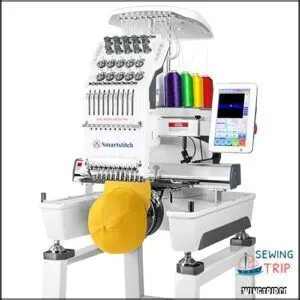
The Smartstitch S1501 commercial embroidery machine is a powerhouse for businesses ready to grow. With 15 needles and a top speed of 1,200 stitches per minute, it handles high-volume orders without compromising quality. Its 14×20-inch work area can manage everything from flat fabrics to 3D caps and leather goods.
Auto thread tension adjustment reduces downtime, and laser positioning ensures precision on intricate designs. The 12-inch touchscreen interface allows for WiFi and USB design transfers in DST/DSB formats.
Priced between $4,399 and $5,299, this machine comes with starter supplies and training materials. Maintenance is straightforward thanks to self-lubrication and thread-break detection—key features that keep production running smoothly.
Best For: Small businesses, home entrepreneurs, and embroidery professionals looking for a multi-needle commercial machine with advanced automation at a mid-tier price point.
- Large 14×20-inch embroidery area handles diverse projects from garments to 3D caps, leather, and bags with laser positioning for precise design placement
- Auto thread tension, color changing, and self-lubrication minimize manual adjustments and downtime during high-volume production runs
- Includes comprehensive starter pack with threads, bobbins, stabilizer, and training resources—plus community support through ambassador networks
- Customer support relies heavily on Facebook Messenger and user groups rather than traditional phone-based service channels
- Build quality may not match industrial-grade machines like Melco, potentially limiting durability for extremely high-volume commercial operations
- Strict 30-day return policy requires keeping all original packaging, pallets, and accessories with photo/video documentation for valid returns
2. Poolin Automatic Embroidery Machine System
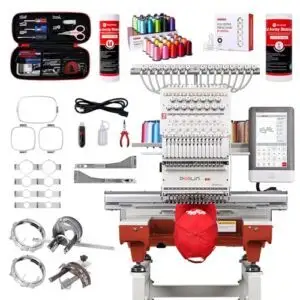
The Poolin Automatic Embroidery Machine System brings professional stitch quality to startups and home-based businesses without the intimidation factor. Its EOC06 model delivers 860 stitches per minute across a 7.9×11.2-inch embroidery area, while electronic thread tension adjustment through the 7-inch touchscreen keeps every pass consistent.
With 15 needles, automatic threading, and USB design import (DST/DSB formats), you’ll handle complex projects with confidence. Machine durability comes from a reinforced metal frame, and the user interface—supporting 10 languages—guides even beginners through setup.
One-year warranty, instructional videos, and 24-hour technical help mean your embroidery machine questions get answered fast, making this a smart entry point for embroidery machine sales.
Best For: Home-based businesses, small commercial startups, and hobbyists ready to handle complex embroidery projects with automated features and professional results.
- High-speed 860-stitch-per-minute operation with 15-needle auto color change handles intricate designs efficiently across a spacious 7.9×11.2-inch work area
- Electronic touchscreen tension control and automated threading, bobbin winding, and thread trimming reduce manual adjustments and speed up workflow
- Complete support package includes teaching videos, 24-hour technical help, one-year warranty, and pre-loaded accessories (hoops, threads, bobbins, stabilizers)
- Steep learning curve for beginners despite simplified interface, requiring time investment to master multi-needle operation and design software
- Heavy metal-frame construction demands multiple people for lifting and may require door removal during installation
- Manual availability limited to certain languages, potentially creating accessibility barriers for some international users
3. Commercial Embroidery Machine Smartstitch S1501
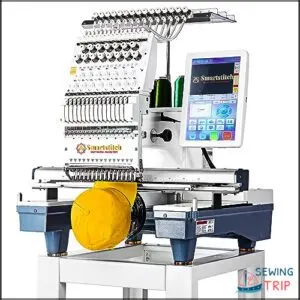
When you’re pushing toward higher output targets, the Smartstitch S1501 delivers the firepower you need. Its 15-needle design and 1,200 stitches per minute embroidery speed make quick work of bulk orders, while the 13.8×19.7-inch work area handles everything from caps to canvas bags.
Laser positioning and automatic color change simplify thread management, keeping stitch quality consistent across denim, leather, and vinyl. The 12-inch touchscreen interface makes on-screen edits easy, and WiFi connectivity keeps design workflows moving smoothly.
Priced around $5,399 with financing options, this commercial embroidery machine is a solid choice for serious embroidery businesses—especially with strong training, active community help, and maintenance resources that minimize downtime.
Best For: Embroidery businesses scaling up production or entrepreneurs ready to handle bulk orders across diverse materials like caps, bags, and apparel.
- 15-needle system with 1,200 SPM and automatic color changes speeds up multi-color jobs and reduces manual thread swaps
- Large 13.8×19.7-inch embroidery area accommodates bigger designs and various products from denim to leather
- Strong training resources, active user community, and responsive technical support help you get up to speed fast
- $5,399 price tag (even with financing) is a significant upfront investment for startups
- Heavy crate requires a forklift and two people for delivery and setup, complicating logistics
- Return process demands keeping original pallets and packaging intact, adding hassle if the machine doesn’t meet expectations
4. Compact Commercial Embroidery Machine System
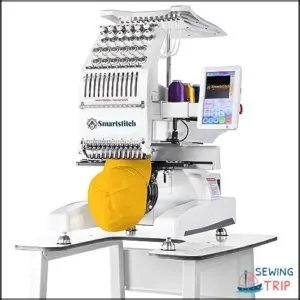
Space-constrained startups no longer have to sacrifice firepower. Compact machines designed for commercial use now deliver 800–1,200 stitches per minute embroidery speed within footprints under 30 inches, offering work areas from 5×7 to 9.5×12.6 inches.
Multi-needle machines (4–10 needles) reduce thread changes and maintain stitch quality across denim, leather, and caps. Machine maintenance stays simple with auto-trimming and laser alignment.
Leading embroidery machine brands like Smartstitch and Brother provide full-featured embroidery machine capabilities—WiFi import, touchscreen editing, and strong technical assistance—making these compact commercial embroidery machines ideal for home-based entrepreneurs and boutique operations targeting ROI without warehouse overhead.
Best For: Home-based entrepreneurs and small embroidery businesses needing commercial-grade speed and features without the footprint or investment of industrial equipment.
- Delivers 800–1,200 SPM performance with multi-needle automation in a space-saving design under 30 inches, fitting tight workspaces while maintaining professional output quality.
- Handles diverse materials from denim to leather with work areas up to 9.5×12.6 inches, plus modern features like WiFi transfer, touchscreen controls, and laser alignment for efficient operation.
- Low entry cost compared to industrial machines (typically $400–$8,000 range) with energy-efficient operation around 180–250W, enabling faster ROI for startups and boutique operations.
- Smaller embroidery area limitations (5×7 to 9.5×12.6 inches) restrict design size compared to full industrial systems, requiring creative workarounds for larger projects.
- Performance depends heavily on proper threading, tension setup, and user skill—operator error can compromise stitch quality and machine reliability.
- Customer support may face delays due to time zone differences, and returns require keeping all original packaging and accessories intact.
5. Industrial Hat Embroidery Sewing Machine
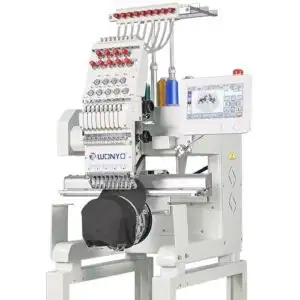
Cap embroidery requires precision—you can’t treat curved surfaces like flat fabric. Industrial hat embroidery machines tackle this with 270° cap frames and cylindrical arms, allowing for ear-to-ear stitching without distortion.
Multi-needle models (15–22 needles) stitch at 1,200 SPM and auto-change colors, slashing setup time by 90%. Commercial options like the Happy HCR3-1501 handle tough materials like denim, canvas, and leather using laser positioning and specialized stabilizers.
Maintenance stays simple, and these machines are built to last through 12-hour shifts. Follow basic tips on thread tension, and it’s clear why 75% of operators rely on these features for consistent, high-volume results.
Best For: Commercial embroidery businesses and entrepreneurs looking to scale cap production with multi-color designs on materials like denim, canvas, and leather.
- 15-needle system with 1,200 SPM speed and automatic color changes cuts setup time by 90% and handles high-volume orders efficiently
- 270° cap frames with laser positioning and specialized stabilizers deliver precise, ear-to-ear embroidery on curved surfaces without distortion
- Includes starter pack, free training, lifetime technical support, and portable design with detachable table for flexibility
- Steep learning curve for first-time users of commercial embroidery machines, requiring time investment in training
- 168 kg weight and large dimensions (38.58″D x 33.07″W x 37.41″H) require significant space and potentially additional support for installation
- Strict return policy requiring original packaging and accessories intact, plus no specified electric requirements may need additional power setup
6. Dual Head Industrial Embroidery Machine
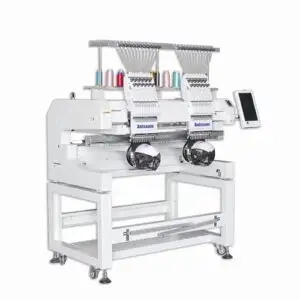
When scaling from single orders to batch runs, dual-head industrial embroidery machines boost production output by 20–25% compared to single-head setups. Each head works independently, so if one stops for maintenance, the other keeps stitching.
You’ll typically find 12–15 needles per head with embroidery fields up to 560×360 mm, ideal for caps and oversized garments. Machines like the Ricoma MT-1502 and BAi Vision 2-head system run at 800 SPM, featuring automatic thread trimming and IoT connectivity for remote monitoring.
Prices range from $6,600 to $13,000—about 1.5 times the cost of single-head machines but with double the capacity, making dual-head systems a clear choice for commercial embroidery needs.
Best For: Small to mid-size embroidery businesses ready to scale production without jumping to full multi-head systems, or entrepreneurs handling bulk orders for caps, garments, and promotional items.
- Doubles output compared to single-head machines while operating independently—if one head needs maintenance, the other keeps running
- 12–15 needles per head with 800 SPM speeds, automatic thread cutting, and IoT connectivity streamline workflows and cut downtime
- Costs only ~1.5x a single-head machine ($6,600–$13,000) but delivers 2x capacity, making ROI faster for commercial operations
- Upfront investment of $6,600–$13,000 can be steep for hobbyists or start-ups without financing options
- Requires operator training and regular maintenance to keep both heads running at peak performance
- Larger footprint (up to 57″D × 44″H) demands dedicated floor space that may not fit home studios
7. Commercial Digital Embroidery Machine Kit
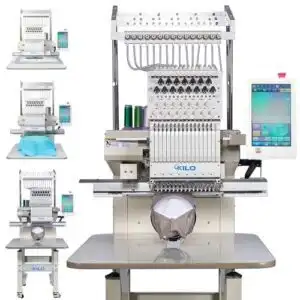
Commercial digital embroidery machine kits combine hardware with embroidery software, design libraries, and thread management tools—everything needed to start custom apparel projects. Most kits include touchscreen interfaces and automatic thread-cutting, with prices ranging from $2,328 to $11,000, depending on needle count and embroidery area.
Multi-needle machines offer top-notch stitch quality and efficiently handle batch orders. Look for kits with CAD compatibility and wireless design transfer to simplify workflows.
Maintenance costs decrease when selecting units with AI-based error correction and IoT monitoring—now standard on 30–40% of commercial machines in 2025.
Best For: Small businesses, promotional product shops, and custom apparel entrepreneurs who need professional embroidery output without investing in industrial-scale equipment.
- Complete starter package includes hardware, software, design libraries, and thread management tools—no need to source components separately or figure out compatibility issues.
- Multi-needle systems with automatic thread-cutting and color-changing handle batch orders efficiently, cutting down labor time by 40–60% compared to single-needle machines.
- Advanced models with CAD compatibility and wireless design transfer simplify workflows, while AI error correction reduces material waste and rework on 30–40% of 2025 commercial units.
- Initial investment ranges from $2,328 to $11,000, with high-end multi-needle units and accessories adding 8–22% to base costs—a significant barrier for startups with limited capital.
- Learning curve exists even with touchscreen interfaces, especially for beginners navigating design software, thread tension settings, and maintenance schedules.
- Storage limits (like 800-pattern capacity on some models) and embroidery area constraints may require upgrades as business volume grows or client demands expand.
8. Ricoma commercial embroidery machine system
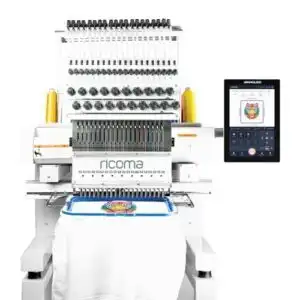
Ricoma machines like the MT-1501 pack serious power—1,200 stitches per minute across 20 needles—so you can tackle multi-color jobs on caps, flats, or finished garments with ease.
Its 19.7″ x 14.2″ embroidery area manages oversized logos without rehooping, and the 10.1-inch touchscreen plus magnetic hoop systems cut setup time by 90%.
Thread tension adjusts on its own, and maintenance drops 70% thanks to smart design.
At $17,595, it’s a solid choice for ambitious startups and growing shops ready to take control of their production.
Best For: Growing embroidery businesses and startups that need high-speed, multi-color production with room to scale without outsourcing.
- Blazing 1,200 stitches per minute across 20 needles handles complex multi-color designs fast
- Huge 19.7″ x 14.2″ embroidery area eliminates constant rehooping on large logos
- Magnetic hoops and auto-thread systems slash setup time by 90% and cut maintenance costs 70%
- $17,595 price tag is steep for hobbyists or brand-new businesses testing the waters
- 30.3″ x 32.7″ x 63″ footprint demands serious floor space
- Learning curve means you’ll need training time before hitting full production speed
9. Commercial Embroidery Machine with Laser
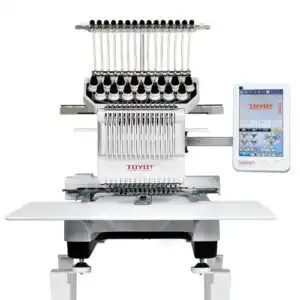
Laser-guided embroidery machines are changing the game for precision and placement. In 2024, 62% of commercial embroidery machines now come with laser modules as standard. These upgrades cut fabric repositioning time by 23% and reduce setup errors by 31%.
Take the TOYOT 15-needle system, for example: it stitches at 1,200 per minute, features laser alignment, and allows WiFi-enabled design imports—all for $4,199.99. It also includes automatic thread tension, precise stitching for dense patterns, and a 10-inch touchscreen that simplifies multi-color projects.
This setup is ideal for caps, jackets, and patches, eliminating the need for constant rehooping.
Best For: Small businesses and hobbyists who need fast, precise embroidery on caps, jackets, and custom apparel without constant fabric adjustments.
- Laser positioning and 1,200 stitches per minute deliver accuracy and speed, cutting setup time by over 40% compared to manual marking
- 15-needle automatic color change and WiFi connectivity make multi-color designs seamless and reduce thread-switching downtime
- Solid metal construction and 10-inch touchscreen offer durability and intuitive control for high-volume projects
- Extremely heavy unit requires 2-3 people to move and set up safely
- No digitizing software included, so you’ll need separate tools to convert artwork into embroidery files
- Limited instructions and occasional missing parts or error messages mean you may need extra support to get started
Essential Features of Commercial Embroidery Machines
Finding the right commercial embroidery machine starts with figuring out what actually matters for your specific setup.
The machine you choose can shift how efficiently you run, the quality you deliver, and whether you can scale up when demand grows.
Here are the core factors worth weighing.
Single-Head Vs. Multi-Head Capabilities
Choosing between a single-head and multi-head setup isn’t just about budget—it’s about matching your machine’s capacity to your actual production volume and turnaround needs.
Single-head embroidery machines are great for small batches, custom orders, and intricate designs where stitch quality is key.
Multi-needle machines and multihead embroidery machines offer faster production speeds and better thread management, making them a good fit for high-volume runs where the machine cost is justified by fabric compatibility and consistent performance.
Automation and Computer Control
Modern automation doesn’t just speed things up—it puts you in command of every stitch, tension adjustment, and color change without hovering over the machine. Computerized embroidery with touchscreen controls and machine learning algorithms delivers precision control you can monitor remotely, while firmware updates keep your intelligent threads system sharp and responsive.
Check out what automated stitching offers:
- Real-time tension adjustments that eliminate thread breaks mid-run
- One-touch color mapping so complex designs execute flawlessly
- Predictive machine maintenance alerts before breakdowns hit your schedule
- Embroidery machine capabilities that learn your workflow and adjust speed accordingly
Design Import and On-Screen Editing
Your embroidery process changes the moment you can load designs directly from a USB drive, wireless device, or cloud library and adjust every detail on a full-color touchscreen before starting.
On-screen editing lets you resize designs, rearrange thread sequences, and tweak stitches instantly—no computer needed. File conversion happens automatically, while firmware updates add more file types, so your machine keeps up with your creative growth.
Specialized Attachments and Accessories
Cap frames, tubular hoops, and chenille attachments turn a standard machine into a specialist—one that can tackle snapbacks, sleeves, and textured appliqué without breaking stride. Add magnetic frames for lightning-fast fabric changes, thread cutters that trim between colors, and needle guards that prevent costly snags.
Stock quality embroidery thread, stabilizing materials, and spare bobbin cases—these embroidery notions and accessories keep your operation running smooth when deadlines don’t wait.
Latest Market Trends and Technological Innovations
Industrial embroidery machines are changing fast. New tech, greener manufacturing, and booming demand in major markets are behind the shift.
These machines can do things now that seemed out of reach just a few years ago.
Here’s what’s driving growth through 2025 and into the next few years.
AI Integration for Precision and Efficiency
Artificial intelligence has quietly become the most powerful upgrade to hit industrial embroidery, slashing error rates by up to 28% while automatically fine-tuning tension, stitch density, and speed in real time. Check out what AI stitching and machine learning bring to your commercial embroidery machine:
- Thread optimization adjusts tension on the fly, preventing breakage and wasted material
- Automated editing corrects design flaws before needle touches fabric
- Smart fabrication adapts stitch patterns to different textiles without manual recalibration
- Professional embroidery machine assistance through AI diagnostics that catch issues early
- Embroidery machine capabilities now incorporate self-learning algorithms that improve with every run
You’re seeing precision that used to require years of operator experience—now built right in.
IoT and Predictive Maintenance
Connected embroidery machines now send performance data, reducing downtime by 33% with predictive alerts for worn parts, tension drift, and maintenance needs—all before issues arise.
You’ll receive automated alerts on your phone when smart sensors detect servo motor wear or thread tension problems. Remote diagnostics allow your embroidery machine service team to troubleshoot from anywhere.
These wireless features turn embroidery equipment into predictive analytics tools, keeping production running smoothly instead of waiting for breakdowns.
Sustainability and Eco-Friendly Models
Eco-friendly embroidery machines saw a 19% jump in demand last year as manufacturers race to cut energy costs and meet sustainability mandates without sacrificing speed. You’ll find versions featuring low-power LED lighting, regenerative drive systems, and water-based thread lubricants—green manufacturing choices that shrink environmental impact.
These commercial embroidery machines deliver energy efficiency while maintaining the precision and embroidery equipment reliability your operation requires.
Regional Growth and Market Forecasts
Asia Pacific continues dominating commercial embroidery machine demand, capturing 63.5% market share as the region’s embroidery machine suppliers drive rapid expansion. Growth projections show the global industrial sector climbing from USD 4.5 billion in 2024 to USD 6.8 billion by 2033—economic indicators reflecting strong appetite across North America and Europe.
Forecast estimates predict Asia Pacific will hit USD 3.27 billion by 2034, cementing leadership in embroidery machines and embroidery machine capabilities innovation. The region’s dominance is driven by factors such as digital transformation trends that are shaping the industry.
Customer Support and After-Sales Services
When you invest in an industrial embroidery machine, the deal doesn’t end at delivery. Your supplier’s backup network—from training and technical help to warranty coverage and parts access—directly impacts your production uptime and long-term ROI.
That’s the difference between a great supplier and an average one.
Supplier Training and Technical Assistance
When you’re investing five figures in an embroidery machine, the right training can mean the difference between launching your business in three weeks or struggling for three months. Look for suppliers offering thorough training programs and responsive technical assistance:
- On-site installation assistance that gets your machine running correctly from day one
- Hands-on embroidery training covering thread tension, design digitizing, and troubleshooting
- Direct customer care lines staffed by technicians who understand embroidery machine functions
- Video tutorials and documentation for managing common embroidery machine issues independently
The level of support you get matters more than you might think—and it’s worth paying extra for a supplier who actually answers the phone.
Warranty and Repair Services
Your machine’s warranty coverage determines whether a critical breakdown costs you nothing or several thousand dollars in emergency repairs. Compare warranty terms carefully—standard coverage usually spans two to five years, while service contracts extend protection and lock in repair costs.
Ask suppliers about their repair center locations, maintenance schedules, and parts replacement policies. Quick technical assistance and authorized machine repair services minimize downtime when you need sewing machine repairs the most. Strong customer service protects your investment.
Parts Availability and Ordering
Even the most reliable warranty is useless if you can’t get the needle bar assembly, bobbin case, or tension spring you need within 24 hours of a breakdown.
Pick suppliers with extensive spare parts inventory and online ordering systems—Jacksew has a dedicated parts website at parts.jacksew.com, and major brands like Tajima and Barudan keep replacement parts at regional distribution centers.
Quick shipping and clear return policies keep your production line running when embroidery machine backup is critical.
Frequently Asked Questions (FAQs)
What financing options exist for bulk purchases?
Bulk buyers often access leasing plans and payment terms that align with trade credit cycles, spreading costs over quarters instead of requiring upfront capital.
Many commercial embroidery machine suppliers offer bulk discounts, flexible financing rates, and loan options designed to match production scale, making high-volume purchases more feasible through customer assistance.
How long does typical machine installation take?
A standard installation usually takes one to three days, depending on the embroidery machine’s capabilities and complexity.
Our technical team handles setup, provides training, and fine-tunes settings to keep downtime to a minimum. This ensures you’re up and running quickly, with ongoing assistance available throughout the process.
Can machines handle metallic or specialty threads?
Modern embroidery machines handle metallic and specialty threads with ease. Top-tier versions come with adjustable thread tension, special needles, and improved feed systems to prevent thread breakage.
You’ll get smooth metallic stitching on specialty fabrics when your single-needle embroidery machine has the right thread settings and supplies designed for challenging materials.
What staff training duration is industry standard?
Industry standards usually require three to five days of initial staff onboarding for commercial embroidery machine operation.
Employee development continues through hands-on practice, with most operators becoming proficient within two weeks.
Skill assessments and training periods vary based on the embroidery machine’s complexity and prior experience with such machines.
Are refurbished machines available from major suppliers?
Most major suppliers offer certified preowned machines alongside their new commercial embroidery equipment. Brands like Tajima, Barudan, and Happy Japan often list refurbished options with warranties, giving you reliable used gear at lower prices.
These machines undergo rigorous testing to guarantee performance.
Conclusion
Imagine your production floor six months from now—either running smoothly or at a standstill, waiting for backordered parts. The choice you make among industrial embroidery machine suppliers will determine your future.
The nine suppliers reviewed in this article stand out for their proven service networks, reliable engineering, and backup systems that keep your operations running profitably.
Don’t just go for the cheapest option; invest in a supplier who’ll be there when your machine breaks down at 2 AM. Your production schedule depends on it.
- https://www.prophecymarketinsights.com/market_insight/Global-Industrial-Embroidery-Machines-Market-1235/market-size
- https://www.verifiedmarketreports.com/product/industrial-embroidery-machine-market/
- https://www.cognitivemarketresearch.com/regional-analysis/north-america-industrial-embroidery-machine-market-report
- https://www.wiseguyreports.com/reports/sewing-and-embroidery-machine-market
- https://www.archivemarketresearch.com/reports/embroidery-machines-for-industrial-use-445000

